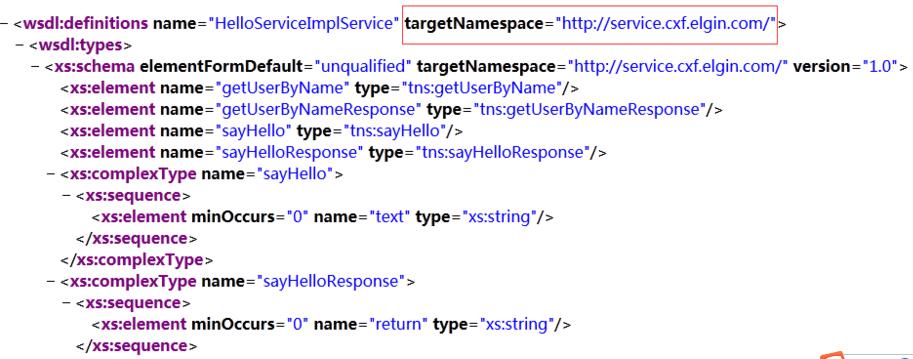WebService—CXF整合Spring实现接口发布和调用过程
Posted
tags:
篇首语:本文由小常识网(cha138.com)小编为大家整理,主要介绍了WebService—CXF整合Spring实现接口发布和调用过程相关的知识,希望对你有一定的参考价值。
一、CXF整合Spring实现接口发布
发布过程如下:
1、引入jar包(基于maven管理)
<!-- cxf -->
<dependency>
<groupId>org.apache.cxf</groupId>
<artifactId>cxf-rt-frontend-jaxws</artifactId>
<version>2.7.18</version>
</dependency>
<dependency>
<groupId>org.apache.cxf</groupId>
<artifactId>cxf-rt-transports-http</artifactId>
<version>2.7.18</version>
</dependency>
会将cxf需要的jar都引入进来,最好是将全部jar都引入。
2、 创建接口(用于向客户端暴露服务)
创建接口
package com.elgin.cxf.service; import javax.jws.WebParam; import javax.jws.WebService; import com.elgin.cxf.entities.User;
@WebService public interface HelloService { public String sayHello(@WebParam(name="text")String text); public User getUserByName(String name); }
接口实现类:
package com.elgin.cxf.service.impl;
import javax.jws.WebService; import com.elgin.cxf.entities.User;
import com.elgin.cxf.service.HelloService; @WebService(endpointInterface="com.elgin.cxf.service.HelloService")
public class HelloServiceImpl implements HelloService {
@Override
public String sayHello(String text ) {
return "hello " + text;
}
@Override
public User getUserByName(String name) {
User user=new User(name);
return user;
}
}
POJO类:
package com.elgin.cxf.entities;
public class User { private String name; public String getName() { return name; }
public void setName(String name) { this.name = name; }
public User(){}
public User(String name) { super(); this.name = name; }
@Override public String toString() { return "User [name=" + name + "]"; }
}
3、 在工程的web.xml文件中增加支持spring与CXF的配置
<?xml version="1.0" encoding="UTF-8"?>
<web-app xmlns:xsi="http://www.w3.org/2001/XMLSchema-instance"
xmlns="http://java.sun.com/xml/ns/javaee"
xsi:schemaLocation="http://java.sun.com/xml/ns/javaee http://java.sun.com/xml/ns/javaee/web-app_3_0.xsd" id="WebApp_ID" version="3.0">
<display-name>CXFWebDemo</display-name>
<welcome-file-list>
<welcome-file>index.html</welcome-file>
<welcome-file>index.htm</welcome-file>
<welcome-file>index.jsp</welcome-file>
<welcome-file>default.html</welcome-file>
<welcome-file>default.htm</welcome-file>
<welcome-file>default.jsp</welcome-file>
</welcome-file-list>
<!-- 加入CXF支持 -->
<servlet>
<description>Apache CXF Endpoint</description>
<display-name>cxf</display-name>
<servlet-name>cxf</servlet-name>
<servlet-class>org.apache.cxf.transport.servlet.CXFServlet</servlet-class>
<load-on-startup>1</load-on-startup>
</servlet>
<servlet-mapping>
<servlet-name>cxf</servlet-name>
<url-pattern>/services/*</url-pattern>
</servlet-mapping>
<!-- 加入spring -->
<context-param>
<param-name>contextConfigLocation</param-name>
<param-value>classpath:applicationContext*.xml</param-value>
</context-param>
<listener>
<listener-class>org.springframework.web.context.ContextLoaderListener</listener-class>
</listener>
</web-app>
4、 增加CXF的配置文件来发布WebService接口
4.1、直接新建CXF的xml配置文件的方式
新建包CXFConfig 用来保存CXF相关的配置文件, 并在此包下新建xml配置文件 CXFServices.xml 。具体配置内容如下:
<?xml version="1.0" encoding="UTF-8"?>
<beans xmlns="http://www.springframework.org/schema/beans"
xmlns:xsi="http://www.w3.org/2001/XMLSchema-instance"
xmlns:jaxws="http://cxf.apache.org/jaxws"
xmlns:soap="http://cxf.apache.org/bindings/soap"
xsi:schemaLocation="http://www.springframework.org/schema/beans http://www.springframework.org/schema/beans/spring-beans.xsd
http://cxf.apache.org/jaxws http://cxf.apache.org/schemas/jaxws.xsd
http://cxf.apache.org/bindings/soap http://cxf.apache.org/schemas/configuration/soap.xsd">
<!--
1.使用jaxws:endpoint标签的配置发布一个 webservice
2.服务提供实现类为 com.elgin.cxf.service.impl.HelloServiceImpl,用implementor属性配置
3.address属性配置外部访问的相对路径
4.使用 jaxws:inInterceptors 标签配置2个日志拦截器,用来打印调用时的日志信息
5.注意:在此配置文件中,需加入jaxws与soap命名空间
-->
<jaxws:endpoint id="helloService"
implementor="com.elgin.cxf.service.impl.HelloServiceImpl"
address="/hello" >
<jaxws:inInterceptors >
<bean id="inMessageInterceptor" class="org.apache.cxf.interceptor.LoggingInInterceptor"/>
<bean id="outLoggingInterceptor" class="org.apache.cxf.interceptor.LoggingOutInterceptor"/>
</jaxws:inInterceptors>
</jaxws:endpoint>
</beans>
将cxf的xml文件引入Spring的xml文件中:
<?xml version="1.0" encoding="UTF-8"?>
<beans xmlns="http://www.springframework.org/schema/beans"
xmlns:xsi="http://www.w3.org/2001/XMLSchema-instance"
xsi:schemaLocation="http://www.springframework.org/schema/beans http://www.springframework.org/schema/beans/spring-beans.xsd">
<!-- 用import标签引入cxf的xml配置文件-->
<import resource="/CXFConfig/CXFServices.xml"/>
<!-- 项目中其它bean配置 -->
<!-- .... -->
</beans>
4.2、将CXF配置文件引入Spring的配置文件中
(1) cxf.xml,cxf-extension-soap.xml,cxf-servlet.xml三个文件都在cxf-2.0.7.jar中把它们拷贝到META-INF/目录下。将cxf的配置文件拷贝出来,定制修改,再引入Spring的xml中。在2.4版本进行了修改,2.4版本以后,只需要引入classpath:META-INF/cxf/cxf.xml.即可。
(2)<beans>元素里面的命名空间一定要正确,特别要增加xmlns:jaxws="http://cxf.apache.org/jaxws",http://cxf.apache.org/jaxws,http://cxf.apache.org/schemas/jaxws.xsd。
<?xml version="1.0" encoding="UTF-8"?>
<beans xmlns="http://www.springframework.org/schema/beans"
xmlns:xsi="http://www.w3.org/2001/XMLSchema-instance"
xmlns:p="http://www.springframework.org/schema/p"
xmlns:jaxws="http://cxf.apache.org/jaxws"
xmlns:cxf="http://cxf.apache.org/core"
xsi:schemaLocation="http://www.springframework.org/schema/beans
http://www.springframework.org/schema/beans/spring-beans-2.5.xsd
http://cxf.apache.org/jaxws
http://cxf.apache.org/schemas/jaxws.xsd">
<import resource="classpath:META-INF/cxf/cxf.xml" />
<import resource="classpath:META-INF/cxf/cxf-extension-soap.xml" />
<import resource="classpath:META-INF/cxf/cxf-servlet.xml" /><bean id="hello" class="cn.com.service.HelloWorldImpl"/><jaxws:endpoint id="helloWorld" implementor="#hello" address="/hello" />
至此,CXF的相关配置完成,将项目加载到Tomcat ,并启动 ,访问 如下URL:http://localhost:8080/CXFWebDemo/services/hello?wsdl ,出现xml数据,说明发布成功。
二、CXF整合Spring实现接口调用
调用过程如下:
1、使用wsdl2Java工具手动生成本地服务端接口代码调用
A : 引入cxf的jar包(用maven管理jar包),生成本地代码。生成java代码后可以直接复制到客户端中再客户端中使用,也可打成jar包(建议)。
用wsdl2Java工具手动生成服务端接口代码,(首先配置cxf的环境变量,配置CXF_HOME 值为E:\\gavin\\cxf\\apache-cxf-3.0.0,在PATH中加入%CXF_HOME%\\bin(也可以直接进到bin目录下再使用命令)。方法如下:
D:\\personal\\apache-cxf-3.2.0\\bin>
wsdl2java -d D:/ http://169.254.123.204:8080/CXFSpring/HelloWorld?wsdl
-d D:/ 表示生成的文件放在D盘下。空格之后跟上wsdl的url。(服务器必须开启,url才能连接上)
wsdl2java -p com -d src -all wsdl 命令说明:
-p 指定其wsdl的命名空间,也就是要生成代码的包名
-d 指定要产生代码所在目录
-client 生成客户端测试web service的代码
-server 生成服务器启动web service的代码
-impl 生成web service的实现代码
-ant 生成build.xml文件
-all 生成所有开始端点代码:types,service proxy,,service interface, server mainline, client mainline, implementation object, and an Ant build.xml file.
补充:
1::可以用eclipse自带的方式生成客户端代码
2::可以通过soapUI等接口调试工具生成客户端代码(需要cxf的jar包,并配置cxf的环境变量)
B : 在Spring的xml配置文件中管理客户端调用接口的Bean组件.
<?xml version="1.0" encoding="UTF-8"?>
<xmlns="http://www.springframework.org/schema/beans"
xmlns:xsi="http://www.w3.org/2001/XMLSchema-instance"
xsi:schemaLocation="http://www.springframework.org/schema/beans http://www.springframework.org/schema/beans/spring-beans.xsd">
<!-- 客户端调用配置 -->
<!-- service bean配置 -->
<bean id="helloService" class="com.elgin.cxf.service.HelloService"
factory-bean="clientFactory" factory-method="create"/>
<!-- client 工厂 ,用来产生service实例 -->
<bean id="clientFactory" class="org.apache.cxf.jaxws.JaxWsProxyFactoryBean" >
<property name="serviceClass" value="com.elgin.cxf.service.HelloService"/>
<property name="address" value="http://localhost:8080/CXFWebDemo/services/hello"></property>
</bean>
<!--另外一种jaxws:client方式 -->
<!-- <jaxws:client id="clientFactory"
serviceClass="com.elgin.cxf.service.HelloService"
address="http://localhost:8080/CXFWebDemo/services/hello" />-->
</beans>
说明:
1:上述的配置文件中,指定了一个bean工厂:org.apache.cxf.jaxws.JaxWsProxyFactoryBean ,该工厂可以通过 serviceClass中的 值来产生对应的服务端接口 service bean
2:同时 address 属性,指定了webservice服务的调用地址 。注意:<property name="address" value="http://localhost:8080/webws/HelloWorld" />中的/HelloWorld要与服务器端applicationContext.xml中的
<jaxws:endpoint id="helloWorld" implementor="#hello" address="/HelloWorld" />的address属性对应。
3:同时我们注意到,有一个类:com.elgin.cxf.service.HelloService ,其实这个类就是服务端的Helloservice接口。在客户端生成的代码中。
C:在controller层调用
@Controller
@RequestMapping("webServiceTest")
public class WebServiceTestController {
@Autowired
private HelloService helloService;
@RequestMapping("test")
public @ResponseBody String test(){
return helloService.sayHello("xiaochangwei");
}
}
2、用JaxWsDynamicClientFactory创建动态的客户端
这种方法调用的优点就是不需要使用wsdl2java来生成服务端的代码。
新建测试类:
public class ClientDynamic {
public static void main(String[] args) {
method2();
}
public static void method2() {
//创建 JaxWsDynamicClientFactory 工厂实例
JaxWsDynamicClientFactory factory=JaxWsDynamicClientFactory.newInstance();
//根据服务地址创建客户端
Client client=factory.createClient("http://localhost:8080/CXFWebDemo/services/hello?wsdl");
Object [] result;
try {
result=client.invoke("sayHello", "World");
System.out.println(result[0]);
result=client.invoke("getUserByName", "Jack");
User user=(User) result[0];
System.out.println(user);
} catch (Exception e) {
e.printStackTrace();
}
}
}
动态调用常见的问题 1:

错误产生的原因:
JaxWsDynamicClientFactory是一个动态代理类,,执行到这里的时候需要编译生成java类,但是JRE是指可以运行class文件,并没有编译的能力,所以需要修改eclipse中的编译环境。产生的原因是没有获得编译环境,也就是JRE设置的问题,需要在eclipse里面把jre设置为jdk下的jre。打开Java的安装路径,发现会有2个jre目录 ,比我我自己的2个目录分别是:
C:\\Program Files\\Java\\jre7
C:\\Program Files\\Java\\jdk1.7.0_17\\jre
现在需要把jre 为jdk下的jre目录 ,也就是上面的第二个。
动态调用常见的问题 2:

对于这条错误 ,根据报错信息来看 :在 http://impl.service.cxf.elgin.com/ 命名空间下没有 sayHello 这个操作。因为CXF发布用的是业务类(HelloServiceImpl.java),那么默认的命名空间就会是业务类所在包(路径),而对外界暴露的则是接口类(HelloService.java),那么对于客户端(第三方)调用访问时,需要按照接口类所在包(路径)进行命名空间的定义。在上述错误的情况下,我们有2种方式来处理 ,一种是在客户端调用时 ,指定接口的命名空间,另一种是在服务端发布WebService服务的时候,明确的指定命名空间,这样就不存在不统一的问题了。
解决方法1:(客户端调用代码)
|
1
2
3
4
5
6
7
8
9
10
11
12
13
14
15
16
17
18
19
20
|
public static void method1(){ //创建 JaxWsDynamicClientFactory 工厂实例 JaxWsDynamicClientFactory factory=JaxWsDynamicClientFactory.newInstance(); //创建客户端 Client client=factory.createClient("http://localhost:8080/CXFWebDemo/services/hello?wsdl"); Object [] result; QName qname; try { //根据指定的命名空间(接口类包名)、方法名新建QName对象 qname=new QName("http://service.cxf.elgin.com/", "sayHello"); result=client.invoke(qname, "World"); System.out.println(result[0]); qname=new QName("http://service.cxf.elgin.com/", "getUserByName"); result=client.invoke(qname, "Jack"); User user=(User) result[0]; System.out.println(user); } catch (Exception e) { e.printStackTrace(); } } |
解决方法2:(在服务端指定命名空间,修改服务端的HelloServiceImpl 类):
ckage com.elgin.cxf.service.impl;
import javax.jws.WebService;
import com.elgin.cxf.entities.User;
import com.elgin.cxf.service.HelloService;
@WebService(endpointInterface="com.elgin.cxf.service.HelloService",
targetNamespace="http://service.cxf.elgin.com/")
public class HelloServiceImpl implements HelloService {
@Override
public String sayHello(String text ) {
return "hello " + text;
}
@Override
public User getUserByName(String name) {
User user=new User(name);
return user;
}
}
重新启动Tomcat,查看链接内容:http://localhost:8080/CXFWebDemo/services/hello?wsdl ,发现命名空间已变为我们指定的名字:

至此,客户端调用完毕!
from: http://www.cnblogs.com/domi22/p/8094517.html
以上是关于WebService—CXF整合Spring实现接口发布和调用过程的主要内容,如果未能解决你的问题,请参考以下文章
